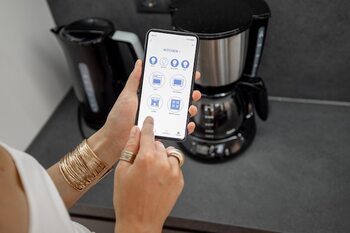Home security technology that prioritizes personal privacy

Home security is a priority, but what about our personal privacy? In a world where technology is advancing rapidly, it is crucial to find solutions that not only protect our homes but also respect our privacy. In this article, we will explore the innovative home security technology that prioritizes personal privacy, ensuring that your space is protected without sacrificing your right to confidentiality. Discover how you can live safely and peacefully with smart and responsible tools.
The importance of protecting your privacy at home
The protection of privacy at home is a fundamental aspect that is often overlooked amid the growing focus on security. As we implement technological devices to safeguard our spaces, we must also consider how these devices can influence our intimacy. Security cameras, monitoring systems, and other internet-connected gadgets are valuable tools, but if they are not designed with privacy in mind, they can become an open door to digital intrusion. Therefore, it is essential to choose technologies that offer robust data protection measures and allow users to have control over what information they share.
Additionally, protecting our privacy goes beyond simply choosing the right devices; it also involves being aware of how we interact with them. The correct configuration of privacy options and the use of secure passwords are crucial steps to minimize risks. Modern technologies must provide transparency in their operation and ensure that users understand what data is collected and how it is used. By prioritizing privacy when selecting home security solutions, we are not only protecting our physical space but also ensuring that our personal lives remain safeguarded against potential external threats.
2. Security devices: Friends or foes of your privacy?
Security devices, such as surveillance cameras, alarm systems, and smart assistants, have revolutionized the way we protect our homes. However, this innovation comes with a dilemma: are they truly allies in our fight for security, or can they become invaders of our privacy? While these tools provide a sense of protection by monitoring suspicious activities and alerting us to potential intruders, their ability to collect data can raise concerns about who has access to that information and how it is used. Therefore, it is essential to evaluate each device not only based on its effectiveness but also on the respect it shows for our privacy. To address this conflict between security and privacy, many companies are developing technologies that prioritize user protection. This includes options such as cameras with local storage that avoid using external clouds to store data and security systems that allow full control over the collected information. Additionally, some devices feature advanced capabilities like end-to-end encryption and customizable settings that enable users to decide what data to share and when. By choosing technologies designed with a privacy-centric mindset, we can enjoy a secure home without compromising our right to privacy.
3. Surveillance cameras: How to choose those that respect your privacy
When choosing surveillance cameras for your home, it is essential to consider those that respect your privacy. Opt for models that offer control over storage and access to recordings. Cameras with advanced encryption features ensure that only you can access the information, preventing unauthorized third parties from accessing your personal data. Additionally, look for devices that allow you to disable recording in real-time or activate a private mode when you are at home, providing you with greater peace of mind while you enjoy your personal space.
Another aspect to consider is the manufacturer's transparency regarding the handling of collected information. Research brands that publicly commit to data protection and provide clear policies on how they manage and store recordings. Also, consider cameras that are compatible with broader security systems and offer integration with mobile applications where you have total control. This way, you can monitor your home without compromising your privacy or feeling constantly watched, thus achieving a balance between security and personal comfort.
4. Alarm systems: Security without compromising personal data
Modern alarm systems have evolved to offer not only effectiveness in detecting intruders but also a conscious approach to user privacy. Many current models use advanced technology that allows for efficient monitoring without relying on the capture or storage of sensitive personal data. For example, alarms can operate with sensors that detect movement or the opening of doors and windows, sending alerts to your mobile device without the need to record images or sounds from the environment, ensuring an additional level of confidentiality. This means you can be confident that your home is protected without having to compromise your personal information.
Additionally, some systems offer the option of local control instead of relying entirely on cloud services. This means that the data generated by the system is stored on local devices such as hubs or central panels, reducing the risk associated with unauthorized access from the Internet. This feature gives owners greater control over their information and how it is used. By choosing an alarm system designed with a strong ethics around privacy, you can enjoy robust security along with the peace of mind that comes from knowing that your data is protected and your privacy remains intact.
5. IoT Technology and its Implications for Home Privacy
IoT technology (Internet of Things) has revolutionized the way we interact with our homes, offering sophisticated and automated security solutions. However, this connectivity also raises serious concerns about personal privacy. Smart devices, from security cameras to connected thermostats, collect vast amounts of data about our daily routines and behaviors. This constant flow of information can be beneficial for optimizing home security, but it also opens the door to potential privacy breaches if not managed properly. It is essential for consumers to be aware of how these devices handle their data and to seek options that prioritize their confidentiality.
To mitigate the risks associated with IoT technology in the home, it is essential to adopt proactive practices that protect our personal information. Choosing devices that offer robust encryption and clear data usage policies can help safeguard our privacy. Additionally, keeping operating systems and firmware updated is crucial to defend against potential vulnerabilities. User education plays a key role: understanding the privacy settings available on each device allows owners to make informed decisions about what data they wish to share and with whom. Ultimately, when integrating IoT technology into our home, we must find a balance between convenience and privacy to ensure a safe environment without compromising our personal freedom.
6. Mobile applications for security control: Are they safe?
Mobile applications for home security control have become an essential tool for many homeowners. However, as we rely more on these technologies to protect our homes, concerns arise about their security and the protection of our personal information. Many of these applications require access to sensitive data, such as locations and cameras, raising questions about how that data is stored and used. It is crucial to choose applications that offer a high level of encryption and clear policies on user privacy, ensuring that our information is not vulnerable to hackers or misuse.
It is also crucial to understand the type of permissions these applications request. When installing a security application, users must be aware of the implications of sharing their personal information. Choosing solutions that prioritize transparency and allow the user to have control over what data is shared is essential to maintain a balance between security and privacy. The careful selection of technological tools not only ensures a safe environment but also protects the fundamental right to privacy in our own homes. Ultimately, trust in our mobile applications must be based on their ability to provide both protection and respect for our personal data.
7. Regulations on data protection in household devices
Data protection regulations play a fundamental role in the implementation of smart home devices. As more households adopt technologies such as security cameras, voice assistants, and connected thermostats, it is vital that these devices comply with rigorous standards that safeguard users' personal information. Regulations like the General Data Protection Regulation (GDPR) in Europe and similar laws in other regions establish clear guidelines on how the data collected by these devices should be handled, stored, and shared. This legislation not only protects the consumer but also requires companies to be transparent about their data collection and usage practices.
It is essential for smart device owners to be informed about the privacy policies associated with each product. When choosing tools for home security, consider those brands that demonstrate a strong commitment to personal data protection and that offer easy settings to manage your preferences. Additionally, being aware of legal updates can help you make more informed decisions regarding which technologies to integrate into your home. In this way, you not only ensure the physical safety of your environment but also the necessary protection for your personal privacy against potential digital vulnerabilities.
8. Tips for keeping your devices secure and private
To keep your devices secure and ensure your personal privacy, it is essential to implement good digital security practices. First, make sure to change the default passwords on all your smart devices. Use strong and unique passwords that include a combination of letters, numbers, and symbols. Additionally, consider enabling two-factor authentication whenever possible, as it provides an extra layer of security by requiring a second verification method before allowing access to your devices.
On the other hand, keep your software updated to protect against known vulnerabilities. This includes not only the operating systems of your devices but also the applications and firmware of security cameras or alarm systems. It is also advisable to review the privacy settings on each device; often, you can disable features that share unnecessary data with third parties. Finally, consider using virtual private networks (VPNs) to encrypt your internet connection when accessing your devices from public networks, thereby protecting your personal information and ensuring a safer digital environment.
9. The future of home security: Innovations that protect your privacy
The future of home security lies at a fascinating intersection of technological innovation and respect for personal privacy. Companies are developing security systems that are not only highly effective but also incorporate measures that ensure the protection of personal data. For example, devices that use artificial intelligence for facial recognition can be programmed to operate without storing images or sensitive information, ensuring that only you and your loved ones have access to your home. This evolution in security technology aims to minimize the vulnerabilities associated with cloud data storage, allowing users to maintain complete control over their information.
Additionally, new solutions like security cameras focused on privacy offer advanced functionalities without compromising your intimacy. These cameras can be configured to record only when they detect motion and have options to disable audio, thus eliminating any potential risk related to the inadvertent capture of private conversations. The integration of secure local networks is also gaining ground; by keeping data within the home and out of reach of the internet, an additional barrier against possible cyber intrusions is established. In this context, it is evident that the future of home security is not only about protecting our physical spaces but also about safeguarding our right to live without concerns regarding our personal privacy.



